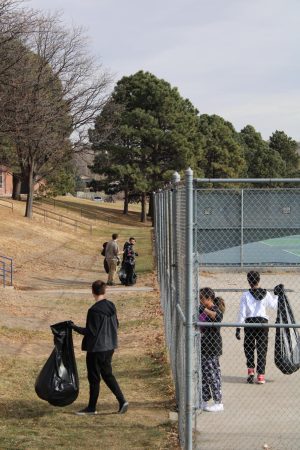Littering: The Big Issue is We Need to Clean Up Chapter 2
May 10, 2023
What is the significant impact of littering? It directly affects climate change. Litter creates chemicals and microparticles that can get into waterways and soil. That affects not only us humans, but animals too. According to an article by Texas Disposal Systems, “60% of water pollution is attributed to litter.” A few lines later in the article, it discusses how litter can also contribute to air pollution, “Researchers estimate that more than 40% of the world’s litter is burned in the open air, which can release toxic emissions. These emissions can cause respiratory issues, other health problems and even be a starting base for acid rain.”
During the beginning of the month on January 1st, the state enacted a 10 cent tax on plastic bags to help try and combat our waste and pollution issues. It was signed by Governor Jared Polis back in 2021. According to KOAA News 5, “Businesses will give 60% of the revenue from the fees to the local government in which they operate. The government can only spend the money on bag fee enforcement and waste diversion programs. The other 40% of the revenue is for businesses to keep.” The new law will eventually ban the use of plastic bags and Styrofoam containers in 2024. Some exceptions will be put in place with the ban as said by The Colorado Sun, “Restaurants that prepare or serve food in individual portions for immediate on- or off-premises consumption would be exempt, as would stores that operate solely in Colorado and have three or fewer locations. Businesses that are still allowed to offer plastic bags must collect a fee of at least 10 cents on each bag. The fee may be higher if a city or county enacts a higher charge.” There are also exceptions when it comes to Styrofoam. “The only exception is that restaurants will be able to continue using Styrofoam products for takeout after that date until their existing inventory is gone.” There are also cities that already have a fee of more than 10 cents in place such as Aspen and Boulder.
Here at Doherty our litter can also directly impact the local businesses. Trash from the parking lots mixed with our windy weather can blow the garbage into surrounding parking lots such as that of Skate City. According to our principal, Ms. Lana Flenniken, “ I think the issue is brought on by multiple factors. The two biggest being that we don’t have an adequate amount of trash cans located outside and that currently some students don’t take pride in how our school looks. They just don’t care. Not all but some.” She also stated that, “We used to have recycling in the cafeteria but again, some students put regular trash in them and the recycling is handled by the Environmental Club, not D11 employees, so it became hazardous for us to have them in the cafeteria and having students separate trash from recyclable materials.” Ms. Flenniken also said that she believes litter is a bigger issue now than it used to be but she doesn’t have any data to back it up.
As stated in the previous paragraph, animals are also directly affected. According to an article by Guilford County Nc.gov, “Researchers estimate that over one million animals die each year after becoming entrapped in or ingesting litter. The most common killer of animals is plastic litter, notably impacting marine animals.” Not only marine animals are killed from litter. In the next paragraph of the article, it talks about how birds are another affected group of animals. “Depending on the type of litter, birds can die from ingesting poisons from moldy food, cigarette butts, and other harmful substances. Plastic, balloons, and brightly colored pieces of litter [look] irresistible to foraging birds but can’t be digested. These items stay in the digestive tract blocking food passage and eventually the bird will starve.” This just happens to be one of the many reasons we need to be more cautious when eating our lunches outside. We might not have marine life here, but we have plenty of birds.





